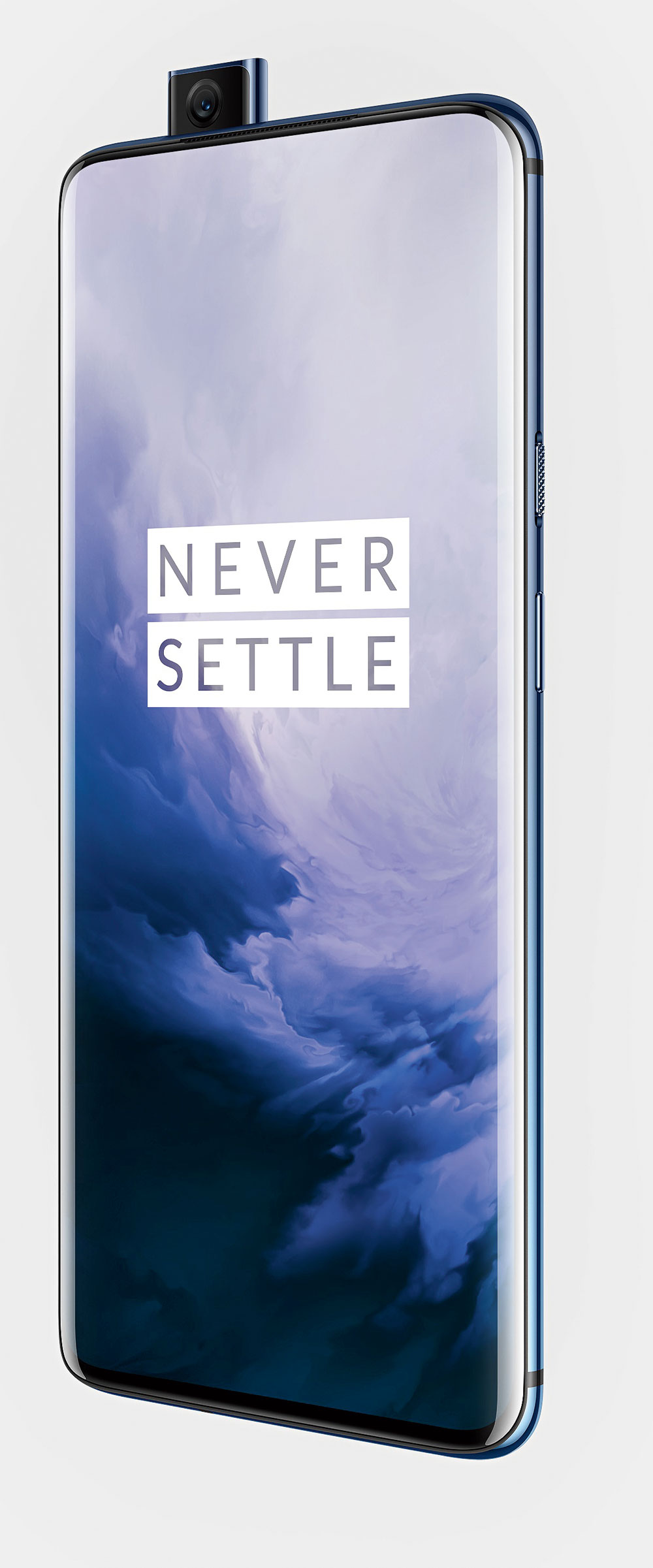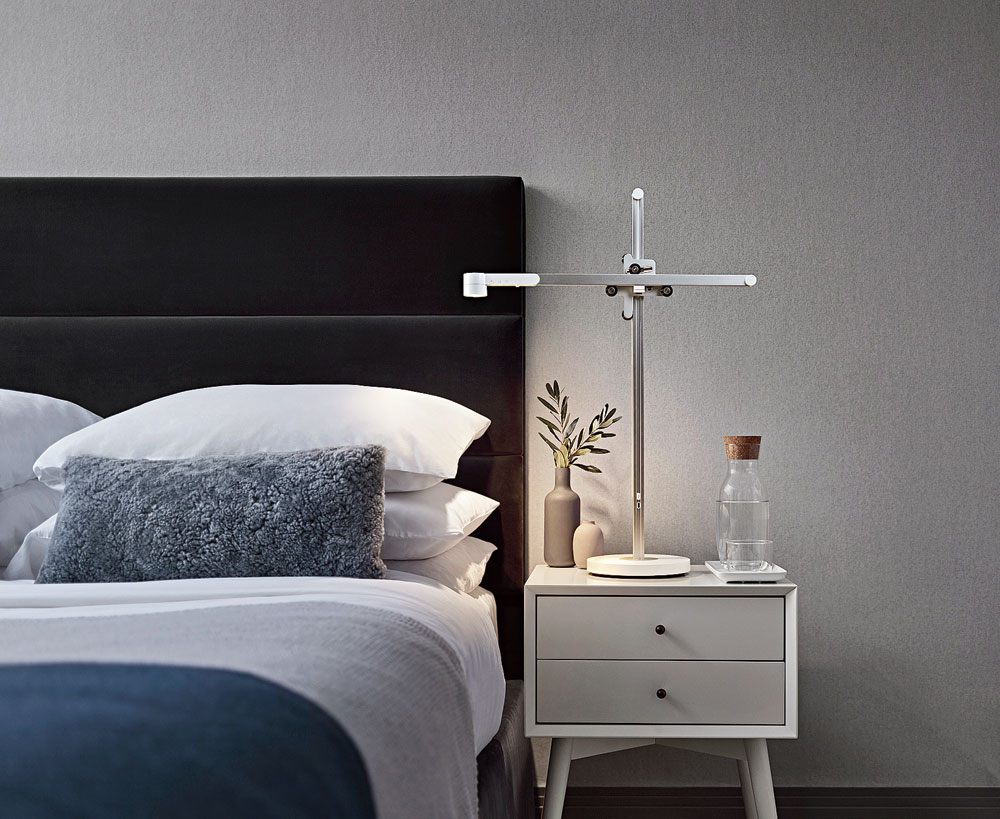OnePlus 7 Pro
Price: Rs 48,999 onwards
With its premium new glass-metal design, a sharper and insanely fluid notch-less display (made possible by a pop-up selfie camera) along with a new triple-camera system on the rear, the OnePlus 7 Pro has more than justified the addition of the “Pro” to its name. It’s OnePlus’ most uncompromised and ambitious smartphone ever, one that can genuinely play with the big boys. The flagship killer has given way to a proper flagship.
The nearly bezel-less design is a big leap forward for OnePlus, taking the previous functional design into the sort of premium glass-metal territory that used to be a Samsung exclusive till recently. The Nebula Blue two-tone matte finish is gorgeous, though the sheer size and weight of the device renders it extremely slippery and unwieldy for smaller hands. The display is the real winner — a QHD+ 90Hz AMOLED panel makes everything, from navigating the Android interface to scrolling through web pages, buttery smooth. Plus with HDR support, this is a contender for the best Android display, bar none. The in-display fingerprint sensor is vastly improved from the 6T as well, as is the haptic motor. Of course, given this is a OnePlus flagship, the performance is uncompromised — Snapdragon 855 with 6,8 or 12GB RAM and the fastest storage on the market come together with the refined and snappy Oxygen OS to make this device a dream to use and game on.
The camera sees improvements, including a versatile 3-camera setup (wide, telephoto, normal), yet it is some way away from the premium flagship grade cameras that we’ve seen on the Huawei P30 Pro and the Samsung S10 series. The high resolution, high refresh rate display impacts battery life and you should expect middling battery performance if you’re running the phone on the highest graphics settings. IP-certified water resistance and wireless charging are tablestakes in the price segment that the Pro is now operating. OnePlus hasn’t yet certified any games at launch to take advantage of the 90Hz display.
Trust Dyson to take a thoughtful and considered approach to designing a task light, factoring in ambient location-based lighting calculations and age-related factors into the new Lightcycle. Given its pricing, it is most likely to appeal to a small niche of working professionals, but few others.
Unpacking and setting up the Lightcycle is almost like a fun do-it-yourself project, with the various components fitting into place while exposing the core mechanical guts — counterweights, springs and all! The six high-power LEDs that evenly light up the area below the light are cooled by an ingenious copper tube cooling system. The brightness and colour temperature can be synchronised based on your location or the ambient light levels. It’ll appeal to architects and product photographers, but for those with the money, it’s also great as a bedside light, with the silky-smooth movement of the arms allowing you to precisely adjust where the light falls while the ambient light sensor adjusts the light levels to suit your surroundings.
Aside from the Dyson Link app with its presets like study, relaxation and precision, you can use the sliding controls on the top to tweak the light levels and brightness between 2,700 and 6,500 Kelvin and 100-1,000 lux. There’s even a movement sensor to detect if there is no one in the room and automatically switch off the light, plus a USB-C port to charge your gadgets if you need.
A price tag that’s not for the faint of heart. Wi-Fi connectivity would have been better than Bluetooth connections to your phone.

OnePlus 7 Pro Source: OnePlus
Pixel 3a XL
Price: Rs 44,999
Owning a Pixel has, for three generations now, been about the pure Android experience with a camera that few can match, but the sticker shock has kept even the most ardent of Android users away. The Pixel 3a and the larger XL variant are all about making the Pixel experience more accessible to a broader audience. However, unless one is picking up a phone solely for the camera experience, the same money will go a lot further with other brands.
The big question — what compromises do the Pixel 3a make to sell at nearly half the price of its pricier Pixel 3 XL cousin? Literally none as far as the rear camera is concerned — it uses the same Sony sensor with all the shooting modes and software magic that we’ve come to love on the Pixels. And the images nail the exposure levels, details and colours. Selfies are great as well, though the lack of the additional 97-degree wide-angle camera is felt in group shots. Battery life, courtesy the frugal chip and lower 1,080p resolution display are excellent, as are the brightness and colour levels on the 6.0-inch gOLED screen. The inclusion of a top-notch vibration motor for haptic feedback is felt (and appreciated) in every single interaction with the device.
The compromise, as many would feel, is around the specs — the mid-range Snapdragon 670 with 4GB of RAM is no pushover and the tuned Android software is a breeze to use, but with OnePlus packing the Snapdragon 855 in the similarly priced OnePlus 7, the Pixel 3a XL is just not competitively priced. While shot-to-shot times are good, the Pixel 3a XL lacks the Pixel Visual Core chip, which means image processing takes a lot longer. Pure Android Pie with zero bloat is all very well, but the 3a XL does not ship with support for unlimited full-resolution image backups to Google Photos, which is a pity. Same, slightly dated, bezel-heavy design

Apple AirPods 2 Source: Apple

Pixel 3a XL Source: Google Pixel
Apple AirPods 2
Price: Rs 14,900 onwards
Virtually indistinguishable from the first generation AirPods, this year’s refresh is all about what’s inside. It’s faster, smarter and longer lasting, thanks to the new H1 chip. And, if you’re willing to pay a little extra, you can get the buds with a Qi-compatible wireless charging case (Rs 18,900) too. For a long-awaited refresh though, the AirPods don’t push the envelope quite as much when it comes to features and earn a recommendation only from Apple loyalists.
The new, purpose-built H1 chip enables a bunch of new features, such as hands-free ‘Hey Siri’ access, faster device connectivity and lower latency during gaming and, crucially, better battery life (up to three hours of talk time). Other than that, they look and behave identically to the first generation devices, which means the fit in the ear and sound quality are the same. About the latter, the sound signature is clean and sharp and will appeal to most, but it lacks a punchy bass.
With the competition having caught up and passed Apple in the wireless earbuds segment, the AirPods are now sorely missing features like water/sweat resistance, passive/active noise cancellation, or adjustable ambient noise, and don’t really feel like a big enough update over the original.
Tushar Kanwar is a tech columnist and commentator. Follow him on Twitter @2shar. Mail your tech queries to t2onsunday@abp.in











